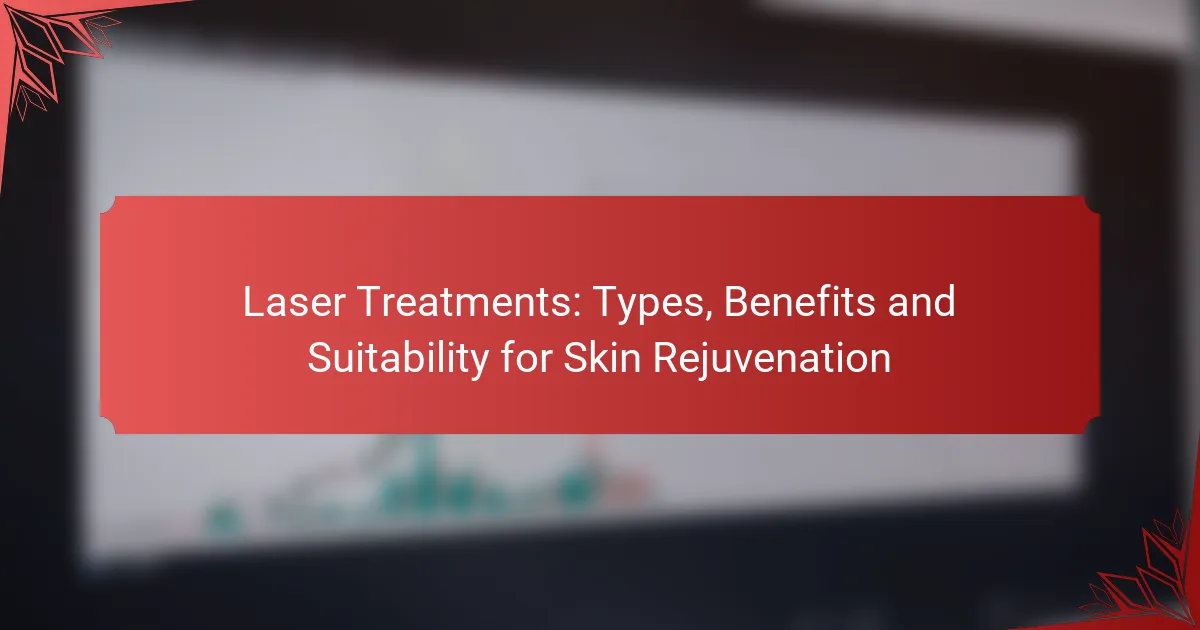Laser treatments for skin rejuvenation encompass a range of techniques designed to address various skin imperfections, enhance texture, and stimulate collagen production. With distinct characteristics tailored to different skin concerns, these procedures offer significant benefits, including improved appearance and overall skin health. Suitable for individuals with issues like acne scars, sun damage, and signs of aging, laser treatments are a popular choice for achieving a youthful complexion.
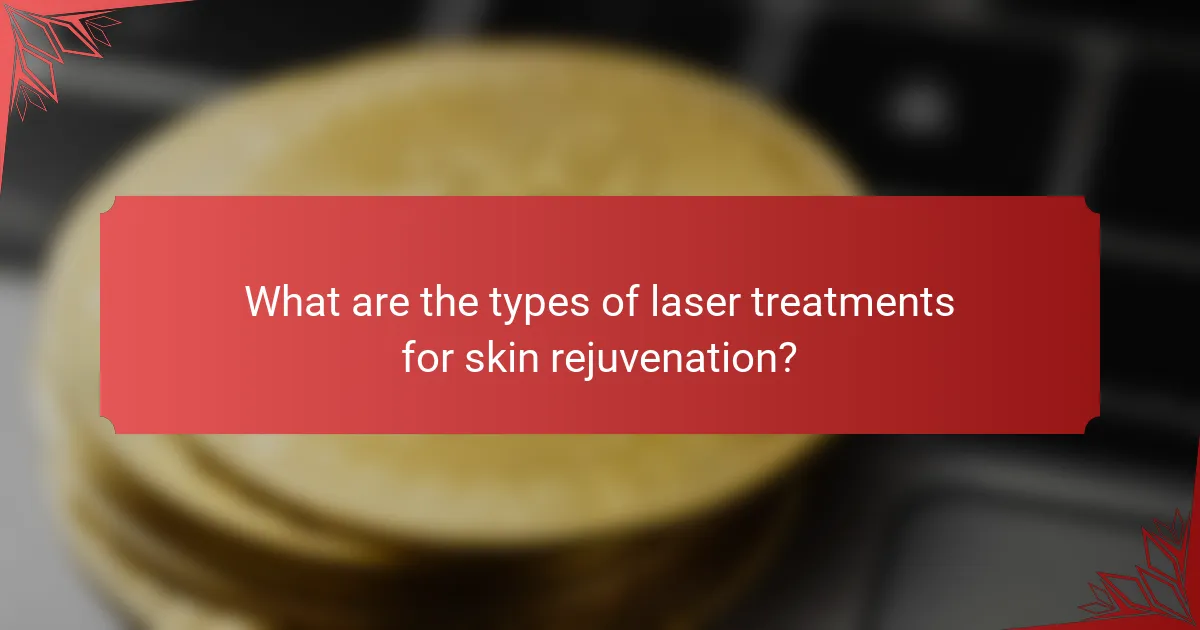
What are the types of laser treatments for skin rejuvenation?
Laser treatments for skin rejuvenation include various techniques that target skin imperfections, improve texture, and promote collagen production. Each type of laser treatment has unique characteristics, making them suitable for different skin concerns and types.
Fractional CO2 laser treatment
Fractional CO2 laser treatment uses carbon dioxide lasers to create microscopic wounds in the skin, stimulating the body’s natural healing process. This method is effective for reducing wrinkles, scars, and sun damage.
Patients typically experience some downtime, with redness and swelling lasting several days. Results can be significant, often improving over a few months as collagen continues to rebuild.
Erbium YAG laser treatment
Erbium YAG laser treatment is designed for more superficial skin issues, such as fine lines and age spots. It removes the outer layer of skin while minimizing damage to surrounding tissues, leading to quicker recovery times compared to CO2 lasers.
This treatment is suitable for lighter skin types and can be performed with minimal discomfort. Patients may see results within a week, with optimal improvements appearing over several months.
Nd:YAG laser treatment
Nd:YAG laser treatment penetrates deeper into the skin, making it effective for vascular lesions and deeper wrinkles. It works by targeting blood vessels and stimulating collagen production without damaging the outer layer of skin.
Recovery is generally quick, with minimal side effects. This treatment is versatile and can be used on various skin types, making it a popular choice for many patients.
Pulsed dye laser treatment
Pulsed dye laser treatment is primarily used for treating redness, rosacea, and other vascular conditions. It emits a concentrated beam of light that targets blood vessels, leading to their destruction while preserving surrounding skin.
Patients often require multiple sessions for optimal results, with each session lasting around 20 to 30 minutes. Side effects are usually mild, including temporary redness and swelling.
Alexandrite laser treatment
Alexandrite laser treatment is effective for hair removal and pigmentation issues. It uses a specific wavelength of light that is well absorbed by melanin, making it suitable for lighter skin tones.
This treatment is fast and can cover large areas quickly, but it may not be ideal for darker skin types due to the risk of hyperpigmentation. Patients typically need several sessions for lasting results, with minimal downtime between treatments.
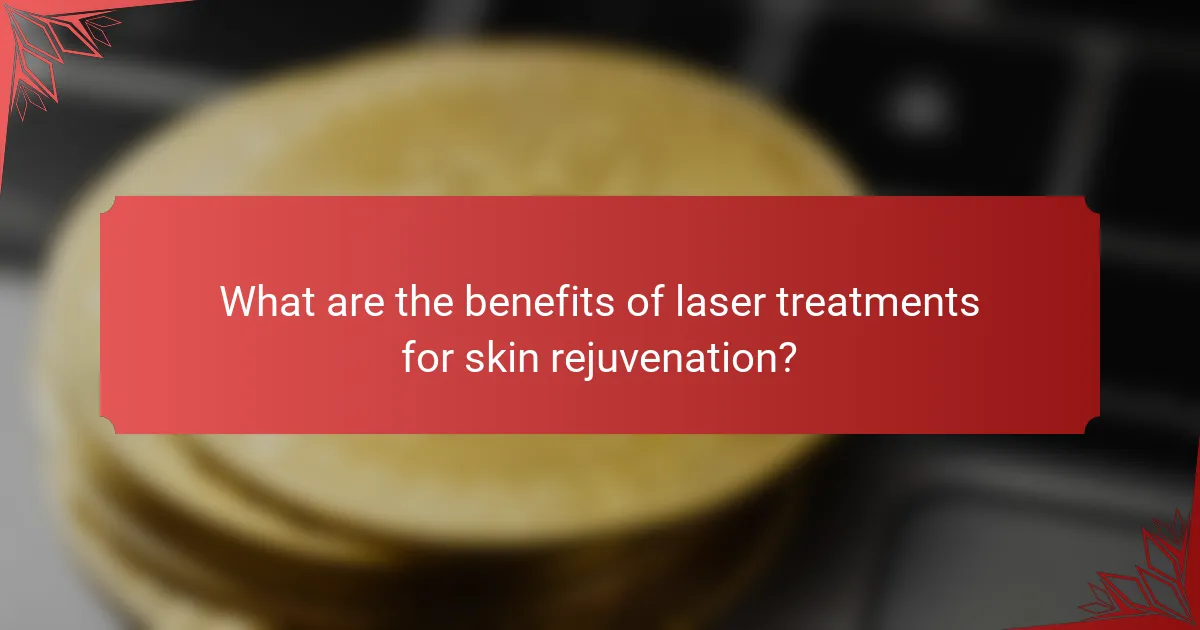
What are the benefits of laser treatments for skin rejuvenation?
Laser treatments for skin rejuvenation offer numerous benefits, including improved appearance, texture, and overall skin health. These procedures can effectively address various skin concerns, making them a popular choice for those seeking a youthful look.
Improved skin texture
Laser treatments can significantly enhance skin texture by removing the outer layer of damaged skin and promoting the growth of new, healthier skin. This process can smooth out rough patches and create a more even surface, leading to a radiant complexion.
Many patients notice improvements in skin texture after just one session, though multiple treatments may be necessary for optimal results. Fractional lasers, for example, target specific areas while leaving surrounding tissue intact, facilitating quicker healing.
Reduction of fine lines
Laser therapies are effective in reducing fine lines and wrinkles, particularly around the eyes and mouth. By stimulating collagen production, lasers help plump the skin and minimize the appearance of these aging signs.
Typically, patients may require several sessions to achieve the desired reduction in fine lines. Treatments like ablative lasers can provide more dramatic results but may involve longer recovery times compared to non-ablative options.
Scar treatment
Laser treatments can effectively treat various types of scars, including acne scars and surgical scars. The laser works by breaking down scar tissue and promoting new skin growth, which can lead to smoother skin over time.
Results vary based on the scar’s age and type, but many patients see significant improvement after a series of treatments. It’s essential to consult with a dermatologist to determine the best laser type for your specific scar concerns.
Enhanced collagen production
One of the key benefits of laser treatments is their ability to enhance collagen production in the skin. Collagen is a vital protein that provides structure and elasticity, and its production naturally declines with age.
Laser treatments stimulate the skin’s healing response, encouraging the body to produce more collagen. This process not only improves skin firmness but also contributes to a more youthful appearance over time.
Minimized pigmentation
Laser treatments can effectively minimize pigmentation issues, such as sun spots, age spots, and melasma. By targeting melanin in the skin, lasers can break down excess pigment and promote a more uniform skin tone.
Patients often see a noticeable reduction in pigmentation after just a few sessions. It’s important to follow post-treatment care instructions to protect the skin and maintain results, especially in sunny climates.
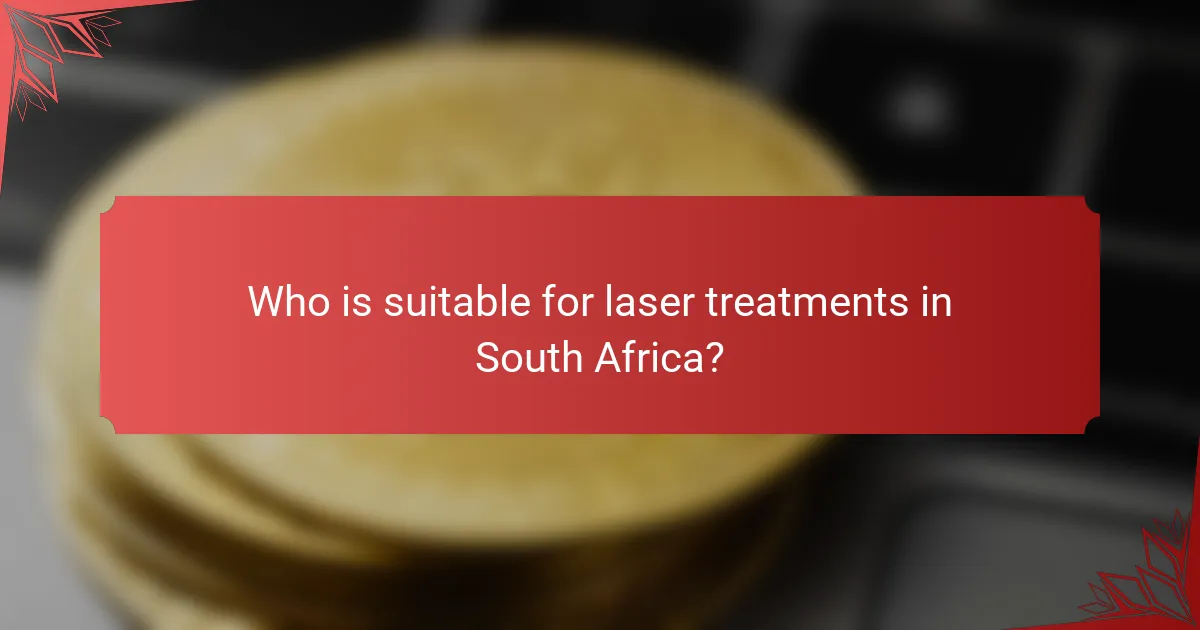
Who is suitable for laser treatments in South Africa?
Laser treatments are suitable for a variety of individuals looking to improve their skin’s appearance and texture. Candidates typically include those with specific skin concerns, such as acne scars, sun damage, signs of aging, uneven skin tone, and varying skin types.
Individuals with acne scars
People with acne scars often find laser treatments beneficial for reducing the visibility of these marks. Treatments like fractional laser therapy can stimulate collagen production, leading to smoother skin over time. It’s advisable to consult a dermatologist to determine the best type of laser for your specific scarring.
People with sun damage
Sun damage manifests as pigmentation, wrinkles, and rough texture, making laser treatments a popular choice for correction. Procedures such as ablative lasers can effectively remove damaged skin layers, promoting healthier skin underneath. Regular sunscreen use post-treatment is essential to prevent further damage.
Patients seeking anti-aging solutions
Laser treatments can significantly reduce signs of aging, such as fine lines and sagging skin. Non-ablative lasers, which do not damage the skin’s surface, are often preferred for those looking for minimal downtime. Results can vary, so multiple sessions may be required for optimal outcomes.
Those with uneven skin tone
Individuals struggling with uneven skin tone can benefit from laser treatments that target pigmentation issues. Lasers can help even out skin tone by breaking down melanin deposits, resulting in a more uniform appearance. Consultation with a skincare professional can help tailor the treatment to specific needs.
Individuals with specific skin types
Laser treatments can be adjusted to suit various skin types, but it’s crucial to choose the right type of laser to avoid adverse effects. For example, darker skin tones may require specific lasers to minimize the risk of hyperpigmentation. Always seek advice from a qualified practitioner to ensure safety and effectiveness.
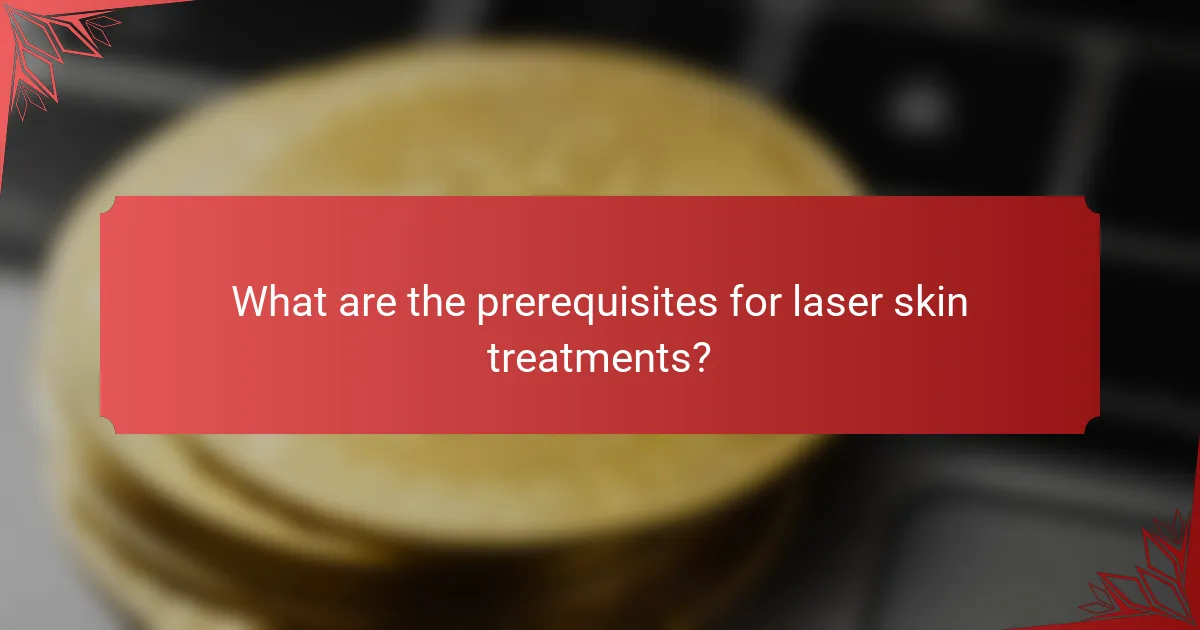
What are the prerequisites for laser skin treatments?
Before undergoing laser skin treatments, patients should meet specific prerequisites to ensure safety and effectiveness. These include a thorough skin assessment, avoiding sun exposure, and discontinuing certain medications that may interfere with the procedure.
Skin assessment by a dermatologist
A comprehensive skin assessment by a qualified dermatologist is essential prior to laser treatments. This evaluation helps determine skin type, condition, and any potential issues that could affect treatment outcomes.
During the assessment, the dermatologist will discuss your medical history, skin concerns, and expectations. This information is crucial for tailoring the treatment plan to your individual needs.
Avoidance of sun exposure
Limiting sun exposure is critical before laser skin treatments. Sunburned or tanned skin can increase the risk of complications and may lead to less effective results.
It is advisable to avoid direct sunlight for at least two weeks prior to the procedure. Using broad-spectrum sunscreen with a high SPF can help protect your skin during this period.
Discontinuation of certain medications
Some medications can affect the skin’s response to laser treatments, so discontinuing them may be necessary. Common medications to avoid include blood thinners, certain anti-inflammatory drugs, and some herbal supplements.
Consult your dermatologist about which medications to stop and for how long before your treatment. This precaution helps minimize risks and enhances the effectiveness of the laser procedure.
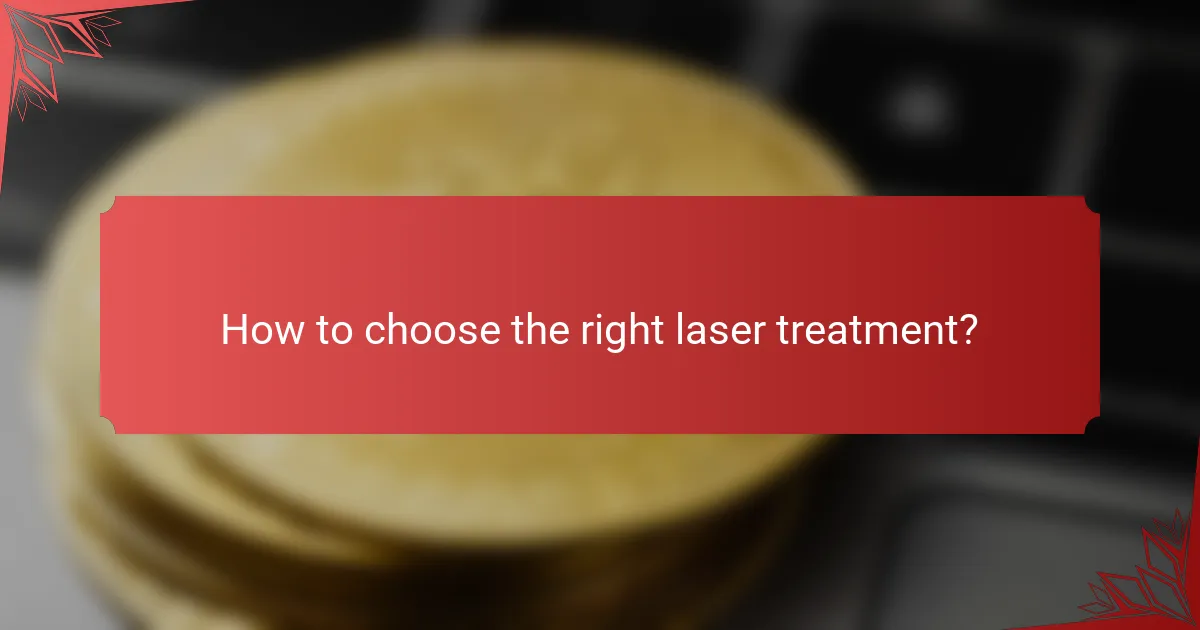
How to choose the right laser treatment?
Choosing the right laser treatment involves assessing your skin type, concerns, and desired outcomes. It’s essential to understand the different types of lasers available and how they align with your specific skin rejuvenation goals.
Consultation with a qualified practitioner
A consultation with a qualified practitioner is a crucial first step in selecting the appropriate laser treatment. During this meeting, the practitioner will evaluate your skin condition, discuss your medical history, and understand your expectations.
Be prepared to ask questions about the types of lasers available, the expected results, and any potential side effects. A knowledgeable practitioner will provide insights into which treatment is best suited for your skin type and concerns, such as pigmentation, wrinkles, or acne scars.
Ensure that the practitioner is certified and experienced in laser treatments. Look for reviews or testimonials from previous clients to gauge their expertise and success rates.
